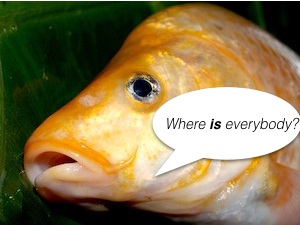 Doing anxiety and depression?, I hear you ask…
Doing anxiety and depression?, I hear you ask…
Yes, doing anxiety and depression!
What am I missing?
A recent study apparently gives us a clearer understanding of ‘how parents pass anxiety and depression on to their kids’.
It describes the three areas of the brain which work together to control our fear response mechanism.
And, according to the new study, how these three areas function are determined by the genes passed down from our parents.
Here’s what Prof Ned Kalin says:
“Over-activity of these three brain regions are inherited brain alterations that are directly linked to the later life risk to develop anxiety and depression.
This is a big step in understanding the neural underpinnings of inherited anxiety and begins to give us more selective targets for treatment.”
OK……. Tell me more…
 There’s something about rhesus monkeys, genetic information and brain scans…
There’s something about rhesus monkeys, genetic information and brain scans…
And about the brainstem, the amygdala and the prefrontal cortex…
And there’s more about the evolutionary advantage of anxiety, which can help an individual identify and avoid danger…
And the problems of an overactive circuit, resulting in anxiety and depression.
And having a clearer picture of where the overactivity lies in the brain, allowing for more targeted ‘treatment’.
Treatment?
What? Are we talking drugs?
And should we be talking drugs, or is there a much healthier and more obvious way forward?
Do you think, as I do, that all too often the first port of call seems to be towards chemical intervention?
And that maybe chemical intervention should be the last resort instead?
You see, to my mind, the elephant in the room is that while this study identified the genetic link, it only accounted for 35% of the difference in anxiety.
What about the other 65%?
Seriously!
Surely that’s going to be of more interest to anyone wanting a better response than the depression and anxiety that they’re currently experiencing?
 So I’d like to ask you a question. How and where from does an individual get their anxiety and depression?
So I’d like to ask you a question. How and where from does an individual get their anxiety and depression?
I believe that most of it (yes, maybe that 65% missing from the report) is learnt.
As we grow up, and right from the beginning, we develop a ‘model’ of the world. Our unconscious, automatic mind helps us to make sense of the world in order to keep us safe, and it’s making decisions on our behalf all the time, with and without our conscious awareness of it.
We learn how the world is; how other people are; how we are and how we fit into that world among other people.
Of course, our beliefs, values, goals, fears and experiences continue to shape our understanding of the world and ourselves.
We continually refine our model and much of what we learn occurs when we are very young and growing up in our family environment.
So who are we predominantly going to learn that stuff from?
Our parents, of course!
Without having to think about it, we are going to pick up that we can’t run out into the road, we must be polite to our aunt (ha ha!), our bedrooms must be tidy and our homework must be done.
We pick up from our families how to behave, what to believe and what to value.
We adopt their strategy for surviving. Which of course includes their response to life’s stressors…
(You’re there now ahead of me, aren’t you?)
Including anxiety and depression – both of which behaviours we have evolved to use, to keep us safe.
Yes! We do anxiety. We do depression. It doesn’t feel like it though, does it! It feels like they do us! Like we have no choice.
 But to experience anxiety or depression, it is necessary for us to execute a particular process – a process of thinking and behaving, which locks the anxiety and/or depression in place.
But to experience anxiety or depression, it is necessary for us to execute a particular process – a process of thinking and behaving, which locks the anxiety and/or depression in place.
So…
If by doing certain things we experience unwanted emotions, then obviously if we do certain other things we are going to experience a whole other outcome.
And if you can engage your unconscious mind in the pursuit of that new outcome, while staying safe, then you’re going to reach that new result so much more quickly and reliably.
That’s where Quest Cognitive Hypnotherapy comes in. It’s quick. It’s painless. And it works!
In fact, it’s the only hypnotherapy entitled to say so, having conducted clinical trials. You can check out the research here.
It’s not the case that just because one of your parents is a sufferer, that inevitably you have inherited the problem. You are not stuck with it. You absolutely can make the difference that you need, albeit with a little help.
What is Quest Cognitive Hypnotherapy?
 Don’t let your child fall behind
Don’t let your child fall behind
As I said to our Boris (Johnson), when he was stuck(!), sat next to me at dinner – “I’m b.ggered if I’m going to allow our young people to conclude that there’s something wrong with them, all for the sake of having a learning strategy that actually works.”
If you know your child ‘could do better‘, talk to me to find out how quickly we can help them discover how to revise for the way their brain prefers to process, store and retrieve information – skills they’ll have for life.
Is this the best question, ever?
Wow! Talk about challenging! A simple question, but boy, can it bring up a whole lot of ‘stuff’, and if you’re courageous enough to actually answer it, can maybe transform your life!
So, what’s your answer? Leave me a comment below…
And just for fun…

